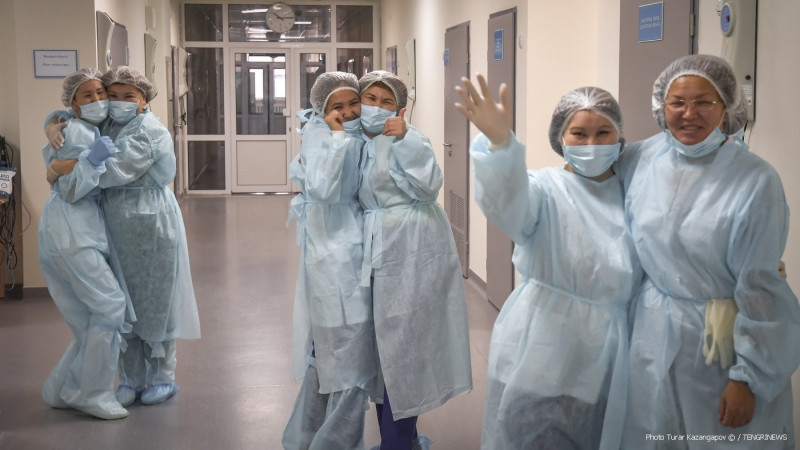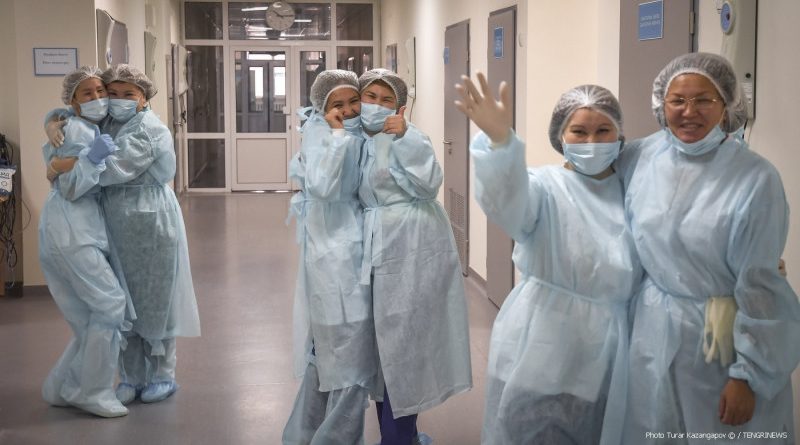Nursing leadership in times of crisis
Author:
Amangali Akanov, Cand.Med.Sc.,
Associate professor of Nursing Chair, Astana Medical University

The main leadership qualities of the head nurse can be formed into a general group as follows:
- Caring for employees
- Engagement of the employee community
- Focus on the primary goal of the nursing community
- Compassion for everyone and compassion for patients
- Opportunities and responsibilities.
Caring for employees: Good leaders take care of their employees, first of all, as people, and then, as workers. This diffirence may not be noticeable during a normal working day, but becomes critical during an emergency. Personnel safety was a priority for all decisions that were made during this period. Both at the command level and at the managerial level. Moreover, as the statistics of the growth of patients from COVID-19 showed, managerial decisions at the national level were made promptly, but at the regional level and at the team level, there is no way to talk about such solidification. This raises the question of joint responsibility, which is a delicate organization both for employees who provide assistance in emergency situations and for consumers of services from below in the same situations. This aspect can be justified by the speed of spread with which COVID-19 is understood as a critical situation. Can it be argued that the understanding of an unknown infection is lagging behind than the very rate of spread of the infection itself? Why did this happen? Is it necessary to change the self-awareness and self-esteem of the population, employees of medical organizations? If we knew the history of the spread of "Spanish flu" (flu) in the early 20th century, could we avoid the losses that we now have? What can we expect in the future? For example, COVID-19 was originally identified as an infectious disease with serious consequences, but its rating was downgraded on March 19, 2020. Should we understand that the Spanish flu analogy is being repeated? How should head and head nurses react to their co-workers?
Community Engagement: Organizations in optional industries (the ability of the subject of power to act as they see fit, choosing any legitimate course of action) are an important part of their communities. They have a lot to lose during the pandemic, but they also have a lot to prove. Social distancing, the isolation regime left its imprints on the level of influence on the effectiveness of the relationship between managers and their staff. The senior nurses and nurses faced certain difficulties. Refusal to work, violation of the work schedule of nurses, absence of nurses at work due to objective reasons (including illness of the nurse herself or her relatives). How can you manage the process in such situation? Are there any alternatives? All this requires a solution.
Focus on a core goal: People are attracted to business activities because they want to build a better life for themselves and their loved ones. For a nurse, this means attention to her work and the contribution she makes to the health of the population. This is where leadership needs to be strong and determined, with a focus on guiding their teams through this difficult time to recovery. Now, stories from China are being shared that normal life is slowly beginning to recover - this gives us confidence that this recovery process will be relatively short-lived and we will cope with it. Here the question arises: how ethical is the activity of the media (mass media) in relation to agitating the mood of the population? What should be done to maintain the working attitude of nurses and not create conditions for the "panic" of the population?
Empathy: True leaders have genuine empathy. They understand that hard times make people stronger and they encourage them to move forward. The senior nurse and chief nurse should listen, trust, and act so that employees felt they were understood, understand their emotions too. Nowadays, support is critical, and nursing leaders need to constantly consider how colleagues feel, regardless of their position, and show empathy. How to maintain your own reputation? What should be used to really show sympathy for a colleague, regardless of the status of the latter?
Opportunities and Responsibility: The conditions of the crisis create danger for us, but on the other hand, opportunities. Nursing leaders should consider all the risks that the virus has provoked, but leaders must not forget that this is also a chance to grow professional. By making important tactical decisions in a difficult emergency and resolving it, the leader builds a reputation not only for himself, but also for the entire team that participated in the implementation of the decision. Well-coordinated, guided work, where everyone knew their position and the amount of work assigned to him; support for reasonable and justified initiatives based on consensus; defending the interests of patients and their team - as the main motivator of the leader's activities, creates conditions for high assessment and recognition as a leader by the senior and chief nurse. There are countless opportunities that can be realized both on a personal and professional level, an example is the promotion of the digital transformation of some work functions (please note: it is “transformation”, not “duplication”) in medical organizations: they used digital platforms for appointments and outpatient consultations, etc. How comprehensive is it given the current development of communications in the region? How trained are staff to accept this need? What has experience shown in a pandemic?
In what capacity and how much can all of this be extrapolated in an emergency, when health workers become the main activists? Is the hierarchical line of relationships changing and to what level is it acceptable? How do the personal qualities of a nurse change when working under quarantine conditions and how does this affect the quality of work? Are these questions important now? How can we create conditions for efficient and normal operation in similar situations?
We would like to know the opinion of the chief and senior nurses of medical organizations, regardless of the status and form of ownership of these organizations. Any opinion is important to us!
References:
1.Rosa W.E., Schlak A.E., Rushton C.H. A blueprint for leadership during COVID-19 // Nursing Management • August 2020, DOI-10.1097/01.NUMA.0000688940.29231.6f
2.Foster S Leadership in the time of crisis // British Journal of Nursing, Vol. 29, No. 7 https://doi.org/10.12968/bjon.2020.29.7.449
3.Hall J. Focus On Trust: Successful Leadership In Times Of Crisis // Forbas, EDITORS' PICK, Mar 22, 2020 https://www.forbes.com/sites/johnhall/2020/03/22/focus-on-trust-successful-leadership-in-times-of-crisis/#69c4e35667b0


